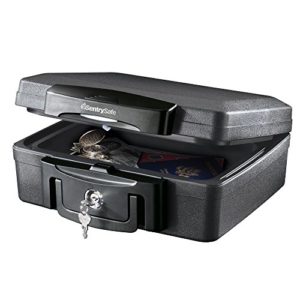If you’re like most people, you aren’t eager to spend time thinking about what would happen if you became unable to direct your own medical care because of illness, an accident, or advanced age. However, if you don’t do at least a little bit of planning — writing down your wishes about the kinds of […]
11 Important Documents You Should Keep in Your Safe
It’s important to keep the documents you need to establish your identity, property ownership, and financial assets safe … which doesn’t mean in your filing cabinet or stacked in a pile on your desk. While you may have digital copies of IDs and tax forms stored on your computer, you should also have a hard copy, in case the digital version is accidentally deleted or your computer crashes. Certain documents deserve a very safe place — like a fireproof safe — in case of identity theft or fire or a break-in. These are the documents you need to put in there.

1. Birth certificates and adoption papers
Keep your original birth certificate and those of your spouse and dependents in your safe. If you need one for reference or proof of identity, make a copy to keep handy. Or you can order a duplicate by contacting the Vital Records office in your state. Keep any legal foster records or adoption papers in your safe, too.
2. Social Security cards
You should never carry your Social Security card with you for identification. It should stay tucked away in your safe at all times, unless you need to bring it to a job interview or provide proof of your identity. Once you do, lock it back up.
3. ID cards and naturalization papers
Get a copy of your military ID, driver’s license, or state-issued ID, as applicable, and keep the copy in your safe. You should also keep your passport or green card in there when not in use. Any other documents you have relating to your citizenship, immigration status, or naturalization should be kept in your safe, as well.
4. Marriage and/or divorce papers
Keep your original marriage certificate and/or divorce papers in your safe. Any legal documents related to your marital status, such as a prenuptial agreement, alimony, or child support agreement, should also be in there in case you need to refer to them again later.
5. Living will
Should something happen to you that prevents you from being able to make decisions about your health, a living will provide instructions for your loved ones to execute on your behalf. This could relieve the burden on them of having to make a difficult decision.
6. Will
A last will and testament, on the other hand, is a detailed account of your estate and lists who gets what once you pass away. If you don’t already have a legal will, put one together and then keep a notarized copy.
7. Power of attorney papers
If you have the power of attorney for anyone (such as an elderly parent), keep the order in your safe. In addition, if you have any formal agreements for caregiving or elder care arrangements, keep those in there, too.
8. Proof of benefits and disability documentation
If you qualify for any government benefits or assistance programs, keep proof of your beneficiary status in your safe. Keep any official documentation regarding a disability, workplace injury, or military injury in your safe, as well.
9. Professional appraisals
If you’ve had a professional appraisal done on your house, or any high-value you item you own (such as original art, heirloom jewelry, or antique furnishings), keep these documents in your safe. If you decide to sell these items later, this documentation will give you the upper hand in the selling process.
10. Deeds and ownership forms
Keep your mortgage papers or any real estate deeds in your safe, as well as the title and registration for any vehicle you own. Don’t forget boats, trailers, and tractors.
11. Financial account info documents
Most, if not all, of our financial documents and statements can be accessed online, but a list of your accounts, including account numbers and institutions for each, would be helpful in cases where you or your loved ones don’t remember or don’t know what accounts you hold. This includes checking and savings accounts, retirement and investment accounts, and life and other insurance policies. You might also want to include a list of usernames and passwords, although there are other, more secure, ways to keep and share passwords.





